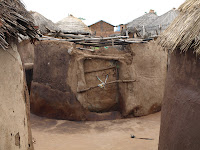 The 86 elderly women crammed two to a room in the dilapidated compounds I visit come from different tribes, different villages, and even different districts. They have one thing in common: forced from their homes, they live in squalor in Gambaga, the capital of the East Mamprusi district, under the care and rule of the local chief. Like most refugees, the brutal conditions they live in now are still much better than the ones they left behind. Unlike most refugees, the conditions they fled were imposed on them by their own communities, the places they grew, and raised families in.
The 86 elderly women crammed two to a room in the dilapidated compounds I visit come from different tribes, different villages, and even different districts. They have one thing in common: forced from their homes, they live in squalor in Gambaga, the capital of the East Mamprusi district, under the care and rule of the local chief. Like most refugees, the brutal conditions they live in now are still much better than the ones they left behind. Unlike most refugees, the conditions they fled were imposed on them by their own communities, the places they grew, and raised families in. The Gambaga Witch Camp was established over 100 years ago, when a local Muslim religious leader demanded that instead of publicly killing the women in the locality deemed as "witches", they should be sent to him for care and "de-witching" under traditional authority. Eventually, custody of the camp and all the women in it was transferred to the Chief of Gambaga, but the conditions, concepts and practices that both inspired the camp and maintain it all remain. The camp walks a thin line between women's shelter and POW settlement. Most of the women accused of witchcraft arrive at the camp heavily drugged and beaten; once put into the custody of the chief, he exposes them to traditional shrines to determine whether they are actually witches--regardless of their testimony or opinion on the matter. If they pass the test, they are sent back to their homes, the witness of the Chief enough to largely clear them of suspicion. If they fail, they are settled at the witch camp--but not before a process of "de-witching", in which they have the small gods of the shrines invoked against them, and are fed potions designed to impede their "spiritual powers".
The man who introduced me to the women is from a local NGO called the Friends of Disadvantaged Women and Children, formed specifically to protect the human rights of those charged with witchcraft in Ghana. He tells me that most common reasons for women being sent to the camp are sickness without treatment, poor harvests, and bad dreams or epilepsy, all blamed on old traditionalist women. In the same breath, he tells me that many of these women ARE witches, and not just women accused of witchcraft; he claims that polygamist practices prompt women to "witch-hunt" the children of their fellow wives, to assure the success and inheritance of their children. This attitude is far from the last contradiction I encounter on my visit here; I am told the women will answer any question I put to them, then find questions about the reasons they are at the witch camp, and whether or not they consider themselves to have "spiritual powers" not even asked of them. The women are allowed to come and go from the camp as they please, but they are required to farm for the Chief even in their advanced age, and with no familial support, have very limited means of securing a supporting income. The ones who are fit enough travel far into the bush to gather firewood; the ones who are not sit in the compound, waiting. Some even have young children sent for them to care for, adding injury and collateral damage to an already insulting situation.
Mariama Aleedu has a sharp mind and bright brown eyes for a woman of her 60's; she has been living at the witch camp for 6 years. When I ask her if she enjoys living here, she tells me of how they suffer hunger, poor living conditions, and unshakable, heart-numbing apathy. When I ask if she would like to go home, she tells me gravely that it isn't safe. Efforts by the Chief and organizations like the Friends of Disadvantaged Women have been made to ensure the stay of these women is more comfortable than at present, but no one has even begun to tackle the issues that force these women here in the first place. The seething, roiling problem that is women's lack of rights in Africa is corroding lives in many ways--the Gambaga Witch Camp is an example of some of the more complex.

.jpg)

No comments:
Post a Comment